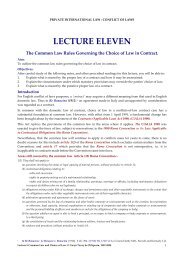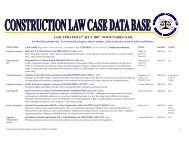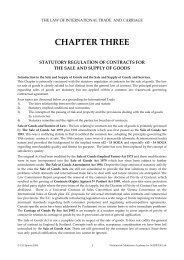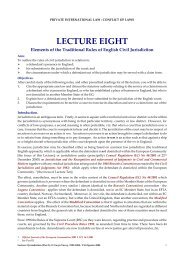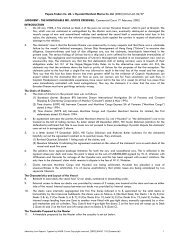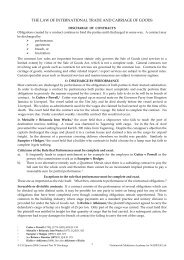Watkin Jones v Lidl UK GMBH (No1) [2001] Adj.L.R. 12/21 1 ... - NADR
Watkin Jones v Lidl UK GMBH (No1) [2001] Adj.L.R. 12/21 1 ... - NADR
Watkin Jones v Lidl UK GMBH (No1) [2001] Adj.L.R. 12/21 1 ... - NADR
You also want an ePaper? Increase the reach of your titles
YUMPU automatically turns print PDFs into web optimized ePapers that Google loves.
<strong>Watkin</strong> <strong>Jones</strong> v <strong>Lidl</strong> <strong>UK</strong> <strong>GMBH</strong> (<strong>No1</strong>) [<strong>2001</strong>] <strong>Adj</strong>.L.R. <strong>12</strong>/<strong>21</strong><br />
JUDGMENT : His Honour Judge Moseley QC : <strong>21</strong>st December <strong>2001</strong>.TCC Cardiff.<br />
Introduction<br />
1. In this Judgment I consider two applications in this action. The first is an application under CPR Part<br />
24 for summary judgment to enforce the decision of an adjudicator made under the Housing Grants<br />
Construction and Regeneration Act 1996. The second is an application to stay a counterclaim under<br />
Section 9 of the Arbitration Act 1996. Both applications arise under the same construction contract<br />
but apart from that feature have little in common; so I will deal with them both separately.<br />
Summary Judgment<br />
2. By a contract in writing dated 5 March <strong>2001</strong> <strong>Watkin</strong> <strong>Jones</strong> & Son Limited (“the contractor”) entered<br />
into a written contract with LIDL <strong>UK</strong> <strong>GMBH</strong> (“<strong>Lidl</strong>”) for the demolition of existing structures and<br />
the construction of a retail store and associated works at High Street, Bangor, Gwynedd, Wales. The<br />
contract was in the JCT Standard Form of Building Contract with Contractorʹs Design, 1998 edition,<br />
incorporating various amendments. As is often the case, by the date of the written agreement work<br />
had already commenced; it commenced on or about 17 July 2000. Practical completion occurred on<br />
22 June <strong>2001</strong>. On 17 July <strong>2001</strong> the contractor submitted to <strong>Lidl</strong>’s agent an application for payment<br />
number 11 which it alleges was an application for an interim payment under the contract. <strong>Lidl</strong> made<br />
no payment in respect of that application and on 22 August <strong>2001</strong> the contractor served a notice of<br />
adjudication referring what they allege was a dispute within the meaning of Section 108(1) of the<br />
1996 Act to adjudication. Mr Gerard Patrick Bergin was, the following day, nominated under the<br />
contract by the Royal Institution of Chartered Surveyors to act as adjudicator and I am indebted to<br />
him for a very clear and helpful analysis of the issues in his decision which is dated 25 September<br />
<strong>2001</strong>. By his decision the adjudicator ordered <strong>Lidl</strong> to pay <strong>Watkin</strong> <strong>Jones</strong> £345,264.99 plus VAT. He<br />
further ordered <strong>Lidl</strong> to pay his fees and expenses totalling £58<strong>12</strong>.34 inclusive of VAT. In the period<br />
between the reference to adjudication and the decision <strong>Lidl</strong> challenged the jurisdiction of the<br />
adjudicator both in a letter dated 31 August <strong>2001</strong> and in a response dated 10 September <strong>2001</strong> to the<br />
contractorʹs notice of referral dated 29 August <strong>2001</strong>. I will need to refer to those arguments in due<br />
course.<br />
3. I need only refer to 4 provisions in the very long construction contract which the parties entered<br />
into. Those provisions are:<br />
Clause 30.3.2: ʺEach Application for Interim Payment shall be accompanied by a detailed price statement of<br />
work executed and material supplied, referenced to the Contract Sum Analysisʺ.<br />
Clause 30.3.3: “Not later than 5 days after the receipt of an Application for payment the Employer shall give a<br />
written notice specifying the amount of payment proposed to be made …”<br />
Clause 30.3.4: “Not later than 5 days before the final date for payment of an amount due pursuant to Clause<br />
30.3.3 [this refers to an amount due as an interim payment] the Employer may give a written<br />
notice to the Contractor which shall specify any amount proposed to be withheld and/or<br />
deducted from that due amount ... ʺ<br />
Clause 30.3.5 “Where the employer does not give any written notice pursuant to Clause 30.3.3 and/or 30.3.4<br />
the Employer shall pay the Contractor the amount stated in the Application for Interim<br />
Paymentʺ.<br />
It is common ground that no notice under Clause 30.3.4 was given by <strong>Lidl</strong> to the contractor.<br />
4. Under Section 108(1) of the Act it is provided that:<br />
ʺA party to a construction contract has the right to refer a dispute arising under the contract for adjudication<br />
under a procedure complying with this section. For this purpose “dispute” includes any difference.”<br />
It is common ground that the contractor and <strong>Lidl</strong> were parties to ʺa construction contract” but <strong>Lidl</strong><br />
denies that there was any dispute or difference between the parties arising under that contract.<br />
<strong>Lidl</strong>’s defence to the application for summary judgment therefore essentially amounts to a challenge<br />
to the jurisdiction of the adjudicator on the grounds that there was no dispute to refer to him.<br />
5. I need say little concerning the structure of the relevant sections of the Act which are by now<br />
familiar to judges sitting in the TCC. The essential features of the legislation is that the construction<br />
contract must provide that the decision of the adjudicator is to be binding until the dispute is finally<br />
<strong>Adj</strong>udication Law Reports. Typeset by <strong>NADR</strong>. Crown Copyright reserved.<br />
1
<strong>Watkin</strong> <strong>Jones</strong> v <strong>Lidl</strong> <strong>UK</strong> <strong>GMBH</strong> (<strong>No1</strong>) [<strong>2001</strong>] <strong>Adj</strong>.L.R. <strong>12</strong>/<strong>21</strong><br />
determined by legal proceedings or arbitration or agreement. In default the adjudication provisions<br />
of a statutory scheme apply: Section 108(3) and (5). It is common ground in the present case that the<br />
contract complies with Section 108(3). The courts have consistently held that the effect of Section<br />
108(3) is to make the adjudicatorʹs decision binding whether or not its validity is challenged (Macob<br />
Civil Engineering Limited v Morrison Construction Ltd [1999] BLR 93 (Dyson J) so long as his<br />
decision is not a nullity for lack of jurisdiction or because he failed to determine the issues which<br />
were put before him by the parties (Bouygues v Dahl-Jensen [2000] BLR 522 (CA) per Chadwick LJ<br />
at 527 (paragraph 27)). In the Bouygues case both Buxton LJ and Chadwick LJ described that second<br />
issue by posing the question whether the adjudicator answered the right question. If he did, whether<br />
he answered it correctly or in the wrong way his decision will nevertheless be binding. If he<br />
answered the wrong question his decision will be a nullity (see Buxton LJ at 525 paragraph <strong>12</strong> and<br />
Chadwick LJ at page 527 at paragraphs 27 and 28). In Sherwood and Casson Limited v Mackenzie<br />
(unreported) November 1999 Judge Thornton QC said:<br />
ʺThe adjudication is intended to be a speedy process in which mistakes will inevitably occur ... The court<br />
should guard against characterising a mistaken answer to an issue which is within an adjudicatorʹs<br />
jurisdiction as being an excess of jurisdiction.ʺ<br />
I adopt that observation. It is clear from the example given by Buxton LJ in Bouygues at paragraph<br />
14, where he refers to an accountant valuing the wrong parcel of shares, that what is envisaged is a<br />
decision by the adjudicator on an issue which is not referred to him for his decision at all. In the<br />
present case therefore there are two main issues: (1) whether there was a dispute between the parties<br />
which the contractor was entitled to refer to adjudication under Section 108(1) and (2) if there was,<br />
whether that was the dispute which the adjudicator addressed in his decision.<br />
6. The factual background relevant to these issues is as follows. I describe it chronologically. On 8 May<br />
<strong>2001</strong> there was a meeting between officers of the contractor and of <strong>Lidl</strong> to discuss progress towards<br />
the drawing up of a final account. On 16 May <strong>2001</strong> the contractor sent to <strong>Lidl</strong> a letter stating that “I<br />
would advise you that our projected final account for the scheme is £1,690,000 plus VAT.ʺ According<br />
to the witness statement of <strong>Lidl</strong>ʹs agent, Mr dʹAlbuquerque, there was a schedule with that letter<br />
explaining the figure. No schedule is referred to in the letter and if there was one I have not seen it. It<br />
is not, 1 think, the schedule at page 274 of the bundle which contains a different bottom line figure.<br />
On 18 June there was a further meeting. At that further meeting there was a discussion of claims<br />
made by the contractor which had been the subject of a previous adjudication. It was agreed that the<br />
meeting should be adjourned so that a detailed final account could be prepared for discussion. On 22<br />
June <strong>2001</strong> practical completion occurred and between that and the reference to adjudication with<br />
which this action is concerned no further work was carried out by the contractor. On 17 July <strong>2001</strong> the<br />
contractor sent to Mr dʹAlbuquerqueʹs office a three page fax comprising a fax cover sheet containing<br />
a hand written note and two letters. Mr dʹAlbuquerque was at the time away on holiday and due to<br />
return to his office on 24 July. The cover note so far as material states that ʺwe enclose our valuation<br />
for the above as enclosed letter from our JG Davies. We have the package with full breakdown in<br />
our office. This can either be posted by Recorded Delivery or can be delivered to your address.<br />
Please advise by return.” “The aboveʺ cross refers to the subject matter of the note which is simply<br />
ʺre <strong>Lidl</strong> Bangorʺ. The first of the two letters reads so far as material “We enclose our valuation<br />
nurnber 11 dated 13 July <strong>2001</strong> for your attention. We should be pleased to receive your certification<br />
as soon as possible. Substantiation documents associated with our variations and claim are also<br />
enclosed.” Those I assume are the “package with full breakdown” referred to in the cover note. The<br />
“valuation number 11 dated 13 July <strong>2001</strong>” is an inaccurate description of the second letter, which is<br />
dated 17 July <strong>2001</strong>, not 13 July, <strong>2001</strong>. That letter is in precisely the same form as previous<br />
applications for interim payments. It states so far as material that “We enclose for your attention our<br />
application for payment number 11 for the period up to 13/07/01 as follows …” There follow figures<br />
for a gross valuation in the sum of £1,714,769 less retention and less previous payment, giving a<br />
bottom line figure described as “amount due” of £444,779.30 plus VAT. The ʺsubstantiation<br />
documentsʺ, consisting of two lever arch files labelled on the spines ʺfinal account” and ʺclaimsʺ<br />
were delivered to Mr dʹAlbuquerqueʹs office some time between a telephone call to him on 23 July<br />
<strong>Adj</strong>udication Law Reports. Typeset by <strong>NADR</strong>. Crown Copyright reserved.<br />
2
<strong>Watkin</strong> <strong>Jones</strong> v <strong>Lidl</strong> <strong>UK</strong> <strong>GMBH</strong> (<strong>No1</strong>) [<strong>2001</strong>] <strong>Adj</strong>.L.R. <strong>12</strong>/<strong>21</strong><br />
and his return to the office after his holiday on 24 July. At the beginning of the final account file<br />
there was an introductory page headed ʺdraft final accountʺ. That I understand is the document at<br />
page 274 of the bundle giving a bottom line figure of £1,714,769, which is the figure given as the<br />
ʺgross valuationʺ in the second of the two faxed letters dated 17 July <strong>2001</strong>. Mr dʹAlbuquerque had a<br />
preliminary look through the two volumes and requested further information which he received on<br />
30 July <strong>2001</strong>. That further information contained 4,000 pages of vouchers. In the meantime, on 26<br />
July <strong>2001</strong> there was a further meeting concerning which there is a disagreement in the evidence on<br />
behalf of the contractor and <strong>Lidl</strong> respectively. The contractor by its witnesses asserts that at that<br />
meeting there was a general discussion concerning a commercial settlement. On behalf of <strong>Lidl</strong> it is<br />
asserted that ʺwe focused on the final account.” It is further said on behalf of <strong>Lidl</strong>, and not disputed<br />
on behalf of the contractor, that ʺit was agreed that John dʹAlbuquerque would need to make a<br />
detailed analysis of the account.” On <strong>21</strong> August <strong>2001</strong>, the day before the notice of adjudication, Mr<br />
dʹAlbuquerque wrote to <strong>Lidl</strong> acknowledging receipt of the 2 files on 24 July <strong>2001</strong> and the subsequent<br />
receipt of the vouchers. The letter continues: “Due to the substantial number of tickets provided, in<br />
excess of 4,000, it will take some time to verify and check. Having carried out an initial inspection of<br />
these tickets, we enclose a separate sheet identifying missing and unreadable copies. Please provide<br />
copies of missing tickets or confirm that they do not exist and copies of the unreadable tickets.<br />
Should you have any queries regarding the enclosed, please do not hesitate to contact me.” Enclosed<br />
with the letter there was another letter setting out detailed queries concerning the tickets/vouchers.<br />
That was the last contact between the parties before the reference to adjudication, which so far as<br />
material contains a definition of the relevant issue as ʺthat <strong>Lidl</strong> <strong>UK</strong> <strong>GMBH</strong> have failed to make<br />
payment of monies to <strong>Watkin</strong> <strong>Jones</strong> Construction under an interim application number 11 submitted<br />
on 17 July <strong>2001</strong>. “ (Page 278 of the bundle).<br />
7. <strong>Lidl</strong> promptly challenged the jurisdiction of the adjudicator, denying that there was ʺa disputeʺ. That<br />
challenge was made by letter from <strong>Lidl</strong>’s solicitors dated 30 August <strong>2001</strong>. That letter is not in the<br />
bundle shown to me but its gist is referred to in a letter in reply dated 31 August <strong>2001</strong> by the<br />
adjudicator. It appears from the adjudicatorʹs letter that the grounds upon which <strong>Lidl</strong> was then<br />
arguing that there was no dispute were different grounds from those put to me on <strong>Lidl</strong>’s behalf at<br />
the hearing of this application for summary Judgment. <strong>Lidl</strong>’s argument as put to the adjudicator was<br />
that application number 11 was solely a final account and final statement which was not due for<br />
payment if at all until the latest of the events referred to at Clause 30.5.5 of the contract, which event<br />
was many months hence, and that until that date was reached there was no dispute capable of being<br />
referred to adjudication. That objection was rejected in the adjudicatorʹs letter in reply. He pointed<br />
out to various features in the application which showed that it served a dual purpose ? first as an<br />
application for an interim payment and second as the contractorʹs draft final account essentially<br />
setting down the agenda for the contractor’s contended entitlement (see page 60 of the bundle). He<br />
concludes that ʺgiven that the referring party alleges that the notice provisions of condition 30.3 have<br />
not been complied with, a matter to be addressed in the response, there is clearly a dispute between<br />
the parties.ʺ By “the notice provisions of condition 30.3” 1 understand him to refer to notices under<br />
Clauses 30.3.3 and/or 30.3.4 (see above) notices which it is common ground was not given. The<br />
adjudication then proceeded and in it <strong>Lidl</strong> repeated the same objection to the adjudicatorʹs<br />
Jurisdiction. The objection is at paragraphs 66 to 69 inclusive of <strong>Lidl</strong>’s response to the contractorʹs<br />
notice of referral, that response being dated 7 September <strong>2001</strong>. Paragraphs 66 and 67 read:<br />
“66. As noted in previous correspondence <strong>Lidl</strong> continues to participate in this adjudication without prejudice<br />
to its contention that the adjudicator does not have jurisdiction to hear this dispute.ʺ<br />
“67. WJ’s position [that is clearly a mistake; it should read <strong>Lidl</strong>’s position] is that application 11 is very clearly<br />
a final account application from its content relative to the contract conditions, its timing and the conduct<br />
of the parties, both before and after that application was submitted. Condition 30 makes a clear provision<br />
for how final account applications are to be dealt with and it is clear from condition 30.5.5 that no dispute<br />
can have arisen at this stage – ie the contractual mechanism leading to conclusivity as to the balance<br />
between the parties is yet to be reached and so the notice provisions of conditions 30.6.1 and 30.6.2 have<br />
<strong>Adj</strong>udication Law Reports. Typeset by <strong>NADR</strong>. Crown Copyright reserved.<br />
3
<strong>Watkin</strong> <strong>Jones</strong> v <strong>Lidl</strong> <strong>UK</strong> <strong>GMBH</strong> (<strong>No1</strong>) [<strong>2001</strong>] <strong>Adj</strong>.L.R. <strong>12</strong>/<strong>21</strong><br />
yet to be operated. There is therefore no dispute between the parties. There is therefore no dispute to refer<br />
to adjudication ʺ.<br />
In his decision dated 25 September <strong>2001</strong> the adjudicator rejected that argument for a second time.<br />
His reasoning in summary is that application number 11 had a dual purpose (paragraph 17.2). It was<br />
both an application for an interim payment and a draft final account. Since it was an application for<br />
an interim payment <strong>Lidl</strong> was required to serve the notices referred to in Clauses 30.3.3 and 30.3.4 of<br />
the contract (see above) failing which it was required by Clause 30.3.5 to ʺpay the contractor the<br />
amount stated in the application for interim paymentʺ. Under 30.3.6 that payment was required to<br />
be made within 20 days of 17 July and since it was not paid there was a dispute which consequently<br />
could be referred to adjudication. The adjudicator therefore concluded that he had jurisdiction to<br />
resolve the dispute.<br />
8. At the hearing of the application for summary judgment before me <strong>Lidl</strong> put its case on jurisdiction in<br />
a modified form. Its main argument was that factually there was no dispute. <strong>Lidl</strong> had been misled<br />
into believing that the application was an application for the drawing up of a final account and,<br />
being of that view, had given instructions to Mr dʹAlbuquerque to investigate the account with a<br />
view to agreeing it. By the date of the contractorʹs notice of adjudication no issues in dispute had<br />
been identified, the contractor had not asserted that it was entitled to immediate payment, and the<br />
notice of adjudication itself did not identify any issue in dispute. His main argument therefore alters<br />
its focus from the characteristics of the application to the factual absence of any dispute concerning<br />
it. <strong>Lidl</strong> however also relied on an alternative argument which relies on similar though not identical<br />
reasoning to that which it put to the adjudicator. This argument is to the effect that the notice of<br />
application read in the context of the other documentation and meetings amounts to a representation<br />
by conduct that the application was an application for a final account; that <strong>Lidl</strong> changed its position<br />
in reliance on that representation by not serving the requisite notices under Clauses 30.3.3 and 30.3.4,<br />
and that consequently the contractor is estopped from asserting that the application was an<br />
application for an interim payment. The argument was not fully developed at the hearing before me<br />
but 1 understand the reasoning to be similar to that which was put to the adjudicator: that the<br />
application for payment is as a result of the estoppel to be treated as an application for a final<br />
account with the consequence that there could be no dispute until the time for payment had arrived.<br />
Was there factually a dispute for the purposes of Section 108(1) of the Act?<br />
9. At the hearing before me the argument on behalf of the contractor as put by Mr Hughes of counsel<br />
was essentially that once one accepts that the application was an application for an interim payment,<br />
it followed inexorably that after the expiry of the 20 days grace provided for in Clause 30.3.6 of the<br />
contract there was a dispute in default of payment. He relied as authority for that proposition on<br />
Halki Shipping Corporation v Sopex Oils Limited [1998] 1 WLR 726 (Court of Appeal). That was a<br />
decision concerning an arbitration agreement to submit disputes or differences to arbitration, an<br />
issue which is closely analogous to that which arises in the present case. The decision of the Court of<br />
Appeal is perhaps most succinctly put by Swinton Thomas LJ at 761G: ʺThere is a dispute once money<br />
is claimed unless and until the defendants admit that the sum is due and payableʺ. Henry LJ in the same<br />
case cross referred to the judgment at first instance of Clarke J and quoted it with approval. Clarke J<br />
had said: ʺThe Ellerine Bros case [Ellerine Brothers (Pty) Ltd v Klinger [1982] 1 WLR 1375] is<br />
authority for the proposition that where a party simply does nothing there is a dispute which the<br />
claimant is both entitled and bound to refer to arbitration.ʺ Mr Hughes argued that that principle<br />
applied to the facts of the present case led to the conclusion that 20 days after the notice of<br />
application and therefore well before the notice of adjudication was a dispute because of non<br />
payment by <strong>Lidl</strong>. By implication he argued that there was such a dispute whether or not <strong>Lidl</strong> was<br />
investigating the figures and whether or not <strong>Lidl</strong>e knew that there was a dispute. Mr Neill on behalf<br />
of <strong>Lidl</strong> referred me to another authority at first instance, being Fastrack Contractors Ltd v Morrison<br />
Construction Limited [2000] BLR 168 (Judge Thornton QC). At page 177 (paragraphs 27 and 28)<br />
Judge Thornton refers to the meaning of a ʺdisputeʺ for the purposes of the 1996 Act and after<br />
referring to Halki Shipping and another Court of Appeal decision (Monmouthshire County<br />
<strong>Adj</strong>udication Law Reports. Typeset by <strong>NADR</strong>. Crown Copyright reserved.<br />
4
<strong>Watkin</strong> <strong>Jones</strong> v <strong>Lidl</strong> <strong>UK</strong> <strong>GMBH</strong> (<strong>No1</strong>) [<strong>2001</strong>] <strong>Adj</strong>.L.R. <strong>12</strong>/<strong>21</strong><br />
Council v Costelloe & Kemple Ltd [1965] 5 BLR 83) summarises the principles at paragraph 28 as<br />
follows:<br />
ʺThese cases help in showing that a claim and its submission do not necessarily constitute a dispute, that a<br />
dispute only arises when a claim has been notified and rejected, that a rejection can occur when an opposing<br />
party refuses to answer. the claim and a dispute can arise when there has been a bare rejection of a claim to<br />
which there is no discernible answer in fact or in law ʺ.<br />
Essentially Mr Neill’s argument is that that is an accurate précis of the legal principles, and that since<br />
there was no rejection by <strong>Lidl</strong> of the claim or any refusal by <strong>Lidl</strong> to answer the claim that at the date<br />
of the notice of adjudication there was no dispute. Mr Hughes argued that Judge Thornton’s<br />
decision was wrong and that I ought not to follow it. I accept Mr Hughes’ argument. It appears to<br />
me that paragraph 28 of Judge Thornton’s decision in Fastrack is irreconcilable with the ratio of<br />
Halki Shipping and defines the word ʺdisputeʺ too narrowly. In my judgment 1 am bound by Halki<br />
Shipping to find that it is not necessary either to refuse to answer or to reject a claim. Passive failure<br />
to admit suffices to constitute a dispute. Mr Hughes had an alternative argument which in the<br />
circumstances I need not consider. He pointed out that the argument now under consideration (the<br />
absence on the facts of any dispute) was a new argument which had not been put to the adjudicator<br />
and that consequently there was an ad hoc submission to the jurisdiction of the adjudicator<br />
notwithstanding any absence of any dispute on the facts, the only challenge to the jurisdiction of the<br />
adjudicator being based on the argument which is no longer advanced being that the notice of<br />
application was an application for a final account in respect of which the time for payment had not<br />
arrived (see above). 1 am not convinced by that argument. The jurisdiction of the adjudicator was<br />
challenged by <strong>Lidl</strong> on the basis that there was no dispute and I am not persuaded that the new<br />
manner of arguing that issue amounts to a submission to jurisdiction. That seems to me wrong:<br />
whether a person submits to the jurisdiction of an arbitrator or adjudicator is a question of fact and<br />
so long as factually the jurisdiction of the adjudicator is challenged on the grounds that there is no<br />
dispute it appears to me that there can be no submission to jurisdiction however the argument<br />
concerning the absence of a dispute is put. However since i agree that there was a dispute this issue<br />
does not arise.<br />
Estoppel<br />
10. Although the estoppel argument was not as clearly put to the adjudicator as it was put to me and<br />
though the word “estoppel” was not mentioned to the adjudicator, it was nevertheless part of <strong>Lidl</strong>’s<br />
case: see paragraphs 7.1 and 38 of <strong>Lidl</strong>’s response. In particular paragraph 7.1 states that <strong>Lidl</strong> ʺhas<br />
always treated application 11 as a final account application (it was submitted as such) and therefore<br />
has not dealt with conditions 30.3.3 and 30.3.4. [<strong>Lidl</strong> should not be penalised by [the contractor]<br />
retrospectively attributing “interim application” status to application 11. The adjudicator dealt with<br />
the issue at paragraph 15.8 of the decision where he refers to the estoppel argument and at<br />
paragraph 17.5 where he rejects it because ʺafter further enquiry at my initiation <strong>Lidl</strong> was unable to<br />
offer any tangible proof of its assertion. So the adjudicator rejected the estoppel argument on its<br />
merits albeit again without referring to the word “estoppel.” It follows that the adjudicator decided<br />
that the contractor was not estopped from asserting that the application was an application for an<br />
interim payment. That is not a decision which <strong>Lidl</strong> is entitled to challenge: it is not as such a decision<br />
concerning jurisdiction and <strong>Lidl</strong> cannot contend that the adjudicator was not addressing the right<br />
question. The fact that the rejection of the estoppel argument by the adjudicator undermines <strong>Lidl</strong>’s<br />
argument concerning jurisdiction seems to me irrelevant. So in my view the principle in Macob must<br />
be applied and Mr Neill’s alternative argument rejected.<br />
No valid application<br />
11. On behalf of <strong>Lidl</strong> Mr Neill put to me an argument under the heading ʺno valid applicationʺ which 1<br />
understand to be as follows. The dispute which was submitted to adjudication by the contractorʹs<br />
notice of adjudication concerned the failure of <strong>Lidl</strong> to make payment of monies due to the contractor<br />
under Interim application number 11. That is a proposition which I accept. His argument was then<br />
that to succeed in the adjudication the contractor needed to prove (1) that it had made a valid<br />
application for interim payment and (2) that money was ʺdueʺ to the contractor pursuant to the<br />
<strong>Adj</strong>udication Law Reports. Typeset by <strong>NADR</strong>. Crown Copyright reserved.<br />
5
<strong>Watkin</strong> <strong>Jones</strong> v <strong>Lidl</strong> <strong>UK</strong> <strong>GMBH</strong> (<strong>No1</strong>) [<strong>2001</strong>] <strong>Adj</strong>.L.R. <strong>12</strong>/<strong>21</strong><br />
application. Mr Neill then proceeded to argue those two subsidiary propositions in detail. He did<br />
not however explain to my satisfaction how those arguments enable <strong>Lidl</strong> to avoid the consequences<br />
of Section 108(3) of the Act (the section which provides that the decision of the adjudicator is<br />
binding). The resolution of the subsidiary issues in <strong>Lidl</strong>’s favour would not lead to the conclusion<br />
that the adjudicator had no jurisdiction under the Act: there was a dispute (see above) arising under<br />
a construction contract which the contractor had a right under Section 108(1) to refer for<br />
adjudication; so all the requirements of a valid reference were established. It appears therefore that<br />
the argument is directed to the proposition that the adjudicator addressed the wrong question and<br />
that consequently his decision was a nullity. There is indeed a reference to that principle in<br />
paragraphs 32 to 34 inclusive of Mr Neill’s skeleton argument though it is unclear to me whether<br />
that is part of the argument which begins under the heading ʺno valid application” at paragraph 11.<br />
I assume however that that is the case since the argument at paragraph 11 would fail unless it were<br />
directed to the wrong question principle. According to paragraph 32 of the skeleton argument the<br />
right question is whether the contractor satisfied the burden of showing that the contractor was<br />
entitled under the contract to receive the payment for which it had applied. 1 regret that I cannot see<br />
how it could be successfully argued that the adjudicator had failed to address that question. He did<br />
address it. He considered the application for payment, held that it was an application for interim<br />
payment, considered the terms of the contract and in particular Clause 30.3.5 and the effect of that<br />
Clause in a case in which the employer had not served the notices envisaged by Clause 30.3.3 and<br />
30.3.4. He came to the conclusion that the contractor was entitled to the payment for which it had<br />
applied. He may well have reached the wrong conclusion, as Mr Neill argued he did, but that is not<br />
the point: Unless he failed to address the right question the decision is binding whether right or<br />
wrong. Consequently 1 cannot see that Mr Neill’s argument under the heading ʺno valid<br />
applicationʺ leads anywhere.<br />
<strong>12</strong>. In case however I have not correctly understood his argument I should briefly refer to the<br />
component parts of the argument. So far as his argument that there was no valid application for<br />
interim payment is concerned he made the following points:<br />
(1) ʺClause 30.3.2 (above) requires that could ʺeach application for interim payment shall be accompanied by a<br />
detailed price statement of work executed and material supplied referenced to the contract sum analysisʺ.<br />
His argument began with the proposition, which I accept, that the application was not accompanied by<br />
such a priced statement of work. I cannot see however that that proposition assists his argument. Clause<br />
30.3.2 clearly distinguishes between the application and the priced statement which must accompany it; so<br />
a failure to serve the accompanying statement does not lead to the conclusion which the proposition is<br />
apparently intended to establish that there was no valid application. In my judgment the argument is<br />
misconceived: there was a valid application which, unfortunately, was not accompanied as required by the<br />
contract by a detailed statement of work executed and material supplied. That doubtless was a technical<br />
breach of contract by the contractor but that breach leads to no consequences. The contract does not impose<br />
any sanction for non compliance with the requirement. So in my judgment the argument leads to no useful<br />
conclusion. In any case it does not establish lack of jurisdiction or that the adjudicator addressed the wrong<br />
question.<br />
(2) Mr Neill’s skeleton argument refers to Clause 4.16.11 of the Employerʹs Requirements, which is not I think<br />
exhibited to any of the witness statements and does not form part of the material supplied to me. There are<br />
extracts from the Employerʹs Requirements at page 284 of the bundle onwards but they do not contain<br />
Clause 4.16.11. However 1 am content provisionally to accept that the Clause is correctly quoted in Mr<br />
Neill’s skeleton argument at paragraph 16. According to that paragraph the Clause reads:<br />
“At least 2 days before the end of each established period of interim valuations the contractor shall submit<br />
to [<strong>Lidl</strong>’s agent] all necessary supporting information to enable [<strong>Lidl</strong>’s agent] to certify payment due to the<br />
contractor.”<br />
Again Mr Neill’s argument starts with the proposition that all necessary supporting information was not<br />
supplied. Again 1 cannot see that this argument assists <strong>Lidl</strong>’s case. The information which was to be<br />
provided was to support something and I infer in the absence of the document itself that it was to support<br />
<strong>Adj</strong>udication Law Reports. Typeset by <strong>NADR</strong>. Crown Copyright reserved.<br />
6
<strong>Watkin</strong> <strong>Jones</strong> v <strong>Lidl</strong> <strong>UK</strong> <strong>GMBH</strong> (<strong>No1</strong>) [<strong>2001</strong>] <strong>Adj</strong>.L.R. <strong>12</strong>/<strong>21</strong><br />
an application for interim payment. The non supply of the supporting information does not render the<br />
application a nullity. So I reject this argument for the same reasons as I reject argument (1) above.<br />
(3) Mr Neill claimed support for that proposition from the Scottish case of Maxi Construction Management<br />
Limited v Morton Rolls Ltd (Outer House of the Court of Session, Lord Macfadyen, unreported 7<br />
August <strong>2001</strong>). In this case the contract did not comply with the requirements of Section 110(1) of the Act<br />
with the consequence that the Scottish Scheme applied. Paragraph <strong>12</strong> of that Scheme defines the meaning of<br />
“claimed by the payee” as meaning “a written notice given by the party carrying out work under a<br />
construction contract to the other party specifying the amount of any payment or payments which he<br />
considers to be due specifying to what the payment relates .... and the basis on which it is .... calculatedʺ.<br />
The contractor chose not to go to adjudication but immediately started court proceedings. Lord Macfadyen<br />
held at paragraph 29 of his judgment that the application for interim payment in issue in that case did not<br />
comply with the requirements of paragraph <strong>12</strong> of the Scheme and was consequently not a ʺclaim by the<br />
payeeʺ. The judge therefore refused a decree de plano, which 1 understand to be the Scottish equivalent of<br />
summary judgment under CPR Part 24. In my judgment that decision has no application to the present<br />
case: the judge was not considering the decision of an adjudicator and in particular was not considering<br />
whether an adjudicator lacked jurisdiction or had addressed the wrong question.<br />
(4) The third argument was that the documentation supplied by the contractor to <strong>Lidl</strong> and in particular the<br />
two lever arch files were an application for a final payment and not an application for interim payment. I<br />
need not deal with that argument in detail: it is not directed to the jurisdiction of the adjudicator nor to the<br />
issue, if different, of whether he asked the right question. The issue was considered by the adjudicator and<br />
he expressed a decision about it. Even if his decision on the issue is wrong, it is binding until a court or<br />
arbitrator decides otherwise. So it does not constitute a defence to a summary judgment application.<br />
(5) The fourth argument turns on Clause 30.3.1.2 which provides for the pattern of interim payments and<br />
concludes with the proviso ʺthat the employer shall not be required to make any interim payment within<br />
one calendar month of having made a previous interim payment.” Mr Neill’s argument is apparently that<br />
since application for interim payment number 10 was made on 2 July <strong>2001</strong> the contractor was not entitled<br />
to submit a further application for interim payment on 17 July <strong>2001</strong>. That argument seems to me<br />
misconceived: Clause 30.3.1.2 is concerned with payment within one calendar month, not with the making<br />
of an application for payment within one calendar month. However as I understand paragraphs <strong>21</strong> and 22<br />
of the skeleton argument read together the argument is to the effect that an application for interim payment<br />
may only he made under Clause 30.3.1.2 ʺas and when further amounts are due to the contractorʺ: because<br />
payment had been made under application number 10 some time after 2 July <strong>2001</strong>, no further payment was<br />
ʺdueʺ until at the earliest one calendar month had expired: consequently the application for interim<br />
payment was premature and, presumably, invalid. That is not a sound argument. It confuses the creation<br />
of the debt and its payment. The contractorʹs case was that the money was due in the sense that there was a<br />
contractual liability to pay it. So the contractor was entitled to make an application for an interim payment.<br />
<strong>Lidl</strong> was not required to make any such payment within one calendar month of the payment which it made<br />
in respect of application number 10, but that does not make application number 11 a nullity. In any event<br />
again the argument does not go to either jurisdiction or to the right question issue.<br />
(6) Mr Neill’s final argument was that it was implicit in Clause 30.3.2 (see above) that the application for<br />
interim payment could only be made in respect of work which had already been executed and materials<br />
which had already been supplied (a proposition which 1 accept); the application included claims for work<br />
not yet executed and materials not yet supplied, a proposition which is established by paragraph 22 of Mr<br />
dʹAlbuquerque’s first witness statement which I also accept; no money was ʺdueʺ in respect of that<br />
unperformed work and unsupplied materials. 1 am uncertain to what the quotation ʺdueʺ refers but<br />
assume that it is a cross-reference to Clause 30.3.1.2 providing that an application for interim payment<br />
may be made after practical completion ʺas and when further amounts are dueʺ. If the proposition (which<br />
is not expressly stated in the argument) is that the inclusion in an application for interim payment of<br />
amounts in respect of unexecuted work and unsupplied materials renders the application a nullity I reject<br />
it. Amounts were claimed in respect of work which had been executed and materials which had been<br />
supplied and the claim for those sums was properly made in the application. The defect identified by Mr<br />
dʹAlbuquerque does not in my judgment render the application a nullity. In my judgment (see below) the<br />
<strong>Adj</strong>udication Law Reports. Typeset by <strong>NADR</strong>. Crown Copyright reserved.<br />
7
<strong>Watkin</strong> <strong>Jones</strong> v <strong>Lidl</strong> <strong>UK</strong> <strong>GMBH</strong> (<strong>No1</strong>) [<strong>2001</strong>] <strong>Adj</strong>.L.R. <strong>12</strong>/<strong>21</strong><br />
adjudicator was correct in ordering the full amount claimed in the application to be paid, that being the<br />
consequence of Clause 30.3.5 requiring the contractor to pay ʺthe amount stated in the application for<br />
interim paymentʺ. Even though that amount included an amount in respect of work which was<br />
unperformed and materials which had not been supplied payment was nevertheless required under Clause<br />
30.3.5.<br />
No money “due” to the contractor from <strong>Lidl</strong><br />
13. This is second leg of Mr Neill’s argument that to succeed the contractor had to show that it had<br />
made a valid application for interim payment and that a payment was ʺdueʺ, but it appears also<br />
from the concluding part of the skeleton argument that Mr Neill may be relying on this leg of the<br />
argument as an independent argument, that argument being that the adjudicator had not examined<br />
the state of the accounts between the parties and had therefore failed to ask himself the right<br />
question. The adjudicatorʹs decision was that because of the failure of <strong>Lidl</strong> to serve a notice under<br />
Clauses 30.3.3 and/or 30.3.4 of the contract it was unnecessary to examine the accounts between the<br />
parties, that being the effect of Clause 30.3.5 and in particular the words ʺthe employer shall pay the<br />
contractor the amount stated in the application for interim paymentʺ.<br />
14. Mr Neill referred to 2 authorities in support of his argument. In my judgment neither authority<br />
lends him support. The 2 cases are:<br />
(1) SL Timber Systems v Carillion Construction Ltd (unreported), a decision of the Outer House of<br />
the Court of Session (Lord Macfadyen). In this Scottish case the judge was considering a contract<br />
which did not contain a similar provision to that in Clause 30.3.5 of our contract, and which did<br />
not comply with the requirements of Section 110 of the Act, with the consequence that the<br />
Scottish Scheme regulations applied. The employer had failed to serve an effective notice of<br />
intention to withhold the payment and the adjudicator had in the circumstances not inquired into<br />
the question whether money was due under the contract to the contractor. Lord Macfadyen held<br />
that that was wrong, that the absence of a notice of intention to withhold payment under Section<br />
110(1) of the Act does not relieve the adjudicator from the burden of deciding whether money is<br />
ʺdueʺ, but he also decided that the adjudicatorʹs failure to undertake that enquiry did not deprive<br />
him of his jurisdiction, with the consequence that the adjudicatorʹs decision was enforced<br />
notwithstanding the adjudicatorʹs error. That lends no support to Mr Neill’s argument in the<br />
present case: <strong>Lidl</strong>’s obligation to pay as ordered by the adjudicator does not turn on Section<br />
111(1) of the Act but on Clause 30.3.5 of the contract. The issue therefore is not what sum is “due”<br />
under the contract, but what amount is stated in the application for interim payment. In any<br />
event the second leg of Lord Macfadyen’s decision, if correct, as in my judgment it is, leads to the<br />
conclusion that the adjudicator in the present case had jurisdiction even if his failure to<br />
investigate the accounts between the parties was an error. In my view 1 should follow Lord<br />
Macfadyen’s decision with which I agree.<br />
(2) The second case upon which Mr Neill relied was C & B Scene Concept Design v Isobars Ltd (Mr<br />
Moxon Browne QC sitting as a deputy High Court Judge). The contract in this case was an earlier<br />
edition of the contract which is in issue in our case and it did contain Clause 30.3.5. However the<br />
judge came to an initial decision that because the parties had failed to complete Appendix 2 to<br />
the contract Clause 30.3.5 had no application, that consequently the Scheme provisions applied<br />
and not the contract provisions, that consequently the adjudicator had fallen into fundamental<br />
error by considering the wrong question. So there is a fundamental distinction between the facts<br />
of the C & B Scene Concept Design case and our case. One of the judgeʹs reasons for refusing<br />
summary judgment to the claimant in that case was the failure of the adjudicator to inquire into<br />
the value of work performed and material supplied, the adjudicator having held that that was an<br />
irrelevant exercise because of Clause 30.3.5. The judge held that that nullified the decision, the<br />
adjudicator having addressed the wrong question. In my judgment that reasoning has no<br />
application in the present case in which Clause 30.3.5 does apply: C & B Scene Concept Design<br />
Limited is an authority on the meaning of the Scheme and on the consequences of a failure of an<br />
adjudicator to inquire into the accounts when the Scheme provisions apply. It has no application<br />
to a case in which the relevant provision is that in Clause 30.3.5. So whether the decision in C & B<br />
<strong>Adj</strong>udication Law Reports. Typeset by <strong>NADR</strong>. Crown Copyright reserved.<br />
8
<strong>Watkin</strong> <strong>Jones</strong> v <strong>Lidl</strong> <strong>UK</strong> <strong>GMBH</strong> (<strong>No1</strong>) [<strong>2001</strong>] <strong>Adj</strong>.L.R. <strong>12</strong>/<strong>21</strong><br />
Scene Concept Design is correct or not – Mr Hughes argued that it was wrong ? it has no<br />
application.<br />
15. For those reasons I reject Mr Neill’s argument. In my judgment the adjudicator was right not to<br />
inquire into the state of the accounts between the parties, being bound by Clause 30.3.5 to order <strong>Lidl</strong><br />
to pay the contractor the amount stated in the application for interim payment.<br />
16. For all those reasons the contractor is entitled to summary judgment on the claim, <strong>Lidl</strong>e having no<br />
real prospects of successfully defending it and there being no other reason why there should be a<br />
trial of the action.<br />
The Counterclaim: should it be stayed?<br />
17. The second application is an application to stay the counterclaim under the provisions of Section 9(4)<br />
of the Arbitration Act 1996. The relevant statutory. provisions are:-<br />
S9(1): A party to an arbitration agreement against whom legal proceedings are brought (... by way of ...<br />
counterclaim) in respect of a matter under which the agreement is to be referred to arbitration may (upon<br />
notice to the other parties to the proceedings) apply to the court in which the proceedings have been brought to<br />
stay the proceedings so far as they concern that matter.<br />
S9(4): On an application under this section the court shall grant a stay unless satisfied that the arbitration<br />
agreement is null and void, inoperative or incapable of being performed.<br />
18. The counterclaim which it is sought to stay is 11 pages long and essentially it attacks the 2 decisions<br />
which have been made in favour of the contractor by adjudicators – ie the decision of Mr Bergin and<br />
an earlier decision of another adjudicator, Mr Phillip Eyre. The details of the counterclaim are for<br />
present purposes not important.<br />
19. The contractorʹs case in support of the application for a stay is as follows:<br />
(1) Article 6A of the contract provides that ʺwhere the entry in the appendix stating that ʺClause 39B<br />
appliesʺ has not been deleted then subject to Article 5 [which is concerned with adjudication] if any<br />
dispute or difference as to any matter or thing of whatsoever nature arising under this contract .... shall<br />
arise between the parties ... it shall be referred to arbitration in accordance with Clause 39B and the JCT<br />
1998 Edition of the Construction Industry Model Arbitration Rulesʺ.<br />
There is a corresponding Article 6B which applies where the words ʺClause 39B appliesʺ in the<br />
appendix have been deleted. In such event any dispute is to be determined by legal<br />
proceedings.<br />
(2) The words ʺClause 39B appliesʺ in Appendix 1 have not been deleted. Ergo any dispute is to be<br />
referred to arbitration.<br />
(3) Clause 39B itself remains in the contract and has not been deleted. It provides as follows:-<br />
ʺWhere pursuant to Article 6A either party requires a dispute or difference to be referred to arbitration<br />
then that party shall serve on the other party a notice of arbitration to such effect in accordance with Rule<br />
2.1 of the Model Arbitration Rules which states..<br />
“Arbitral proceedings are begun in respect of a dispute when one party serves on the other a written<br />
notice of arbitration identifying the dispute and requiring him to agree to the appointment of an<br />
arbitratorʺ<br />
an arbitrator shall be an individual agreed by the parties or appointed by the person named in the<br />
Appendix in accordance with Rule 2.3 which states:<br />
ʺIf the parties fail to agree on the name of an arbitrator within 14 days (or any agreed extension) after: (1)<br />
the notice of arbitration is served .... either party may apply for the appointment of an arbitrator to the<br />
person so empowered.”<br />
(4) Machinery is provided in the contract for the appointment of an arbitratorʺ.<br />
20. Mr Neill argued:<br />
(1) That it had been the intention of the parties to strike out the words ʺClause 39B appliesʺ in<br />
Appendix 1 to the contract but by mistake they had omitted to do so. In support of that<br />
proposition Mr Neill referred to:<br />
<strong>Adj</strong>udication Law Reports. Typeset by <strong>NADR</strong>. Crown Copyright reserved.<br />
9
<strong>Watkin</strong> <strong>Jones</strong> v <strong>Lidl</strong> <strong>UK</strong> <strong>GMBH</strong> (<strong>No1</strong>) [<strong>2001</strong>] <strong>Adj</strong>.L.R. <strong>12</strong>/<strong>21</strong><br />
(a) Page 9 of the Employerʹs Requirements dated July 2000 which states that ʺClause 613<br />
appliesʺ. He argued that the Employerʹs Requirements were incorporated into the<br />
contract by Article 4. 1 reject that argument. Article 4 does not incorporate the<br />
Employerʹs Requirements into the contract but merely identifies them as a document<br />
signed by the parties. 1 accept however that it is relevant to consider the employerʹs<br />
requirement document as providing evidence of the intention of the parties when<br />
entering into the contract. Mr Neill is assisted in that argument (which is an argument<br />
directed to rectification and not to the construction of the contract) by the third recital to<br />
the contract which recites that the contractor has examined the Employerʹs<br />
Requirements.<br />
(b) The deletion in Appendix 1 to the contract of the paragraphs identifying the appointor<br />
of the arbitrator (see page 157 of the bundle). 1 agree that that provides some evidence<br />
that the intention of the parties as established by the Employer’s Requirements<br />
continued until contracting. That however is again an argument directed to rectification<br />
rather than to the construction of the contract.<br />
(2) That by virtue of the deletion of the machinery for the identification of an appointor in<br />
Appendix 1 to the contract the arbitration agreement was null and void, inoperative or<br />
incapable of being performed within the meaning of Section 9(4) of the 1996 Act. 1 reject that<br />
argument. Clause 39B.1.1 provides machinery for the appointment of an arbitrator by<br />
agreement, and in default of agreement the parties can apply to the court: see the Arbitration<br />
Act, 1996 Section 18.<br />
<strong>21</strong>. In my judgment Mr Neill’s argument is essentially that the contract needs to be rectified. In support<br />
of his case on that issue he can refer to the second witness statement of Mr Ramsey which deals with<br />
the intention of the parties, to the relevant part of the Employerʹs Requirements, and to the deletion<br />
of the machinery in Appendix 1. That possibility of rectification is however not a ground on which I<br />
can refuse a stay: the possibility of rectification does not render the agreement null or void or<br />
inoperative or incapable of being performed within the meaning of Section 9(4) of the Act. Whether<br />
or not the contract should be rectified is itself a dispute or difference which must be referred to<br />
arbitration, and by Clause 39B.2 the arbitrator has power to rectify the agreement. Insofar as that<br />
rectification affects his own jurisdiction the arbitrator has power under Section 30(1)(a) of the Act to<br />
rule upon his own substantive jurisdiction and in particular to decide whether or not there is a valid<br />
arbitration agreement.<br />
22. In my view therefore the counterclaim must be stayed under Section 9 of the Act.<br />
Conclusion<br />
23. I will in the circumstances and for the reasons set forth in this judgment:<br />
(1) Give summary judgment for the claimant on the claim and;<br />
(2) Stay the counterclaim.<br />
<strong>Adj</strong>udication Law Reports. Typeset by <strong>NADR</strong>. Crown Copyright reserved.<br />
10


![Watkin Jones v Lidl UK GMBH (No1) [2001] Adj.L.R. 12/21 1 ... - NADR](https://img.yumpu.com/10629615/1/500x640/watkin-jones-v-lidl-uk-gmbh-no1-2001-adjlr-12-21-1-nadr.jpg)
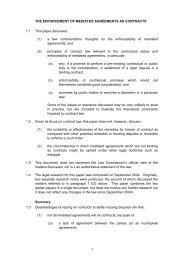

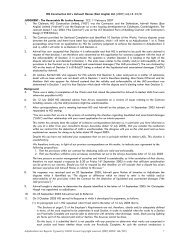
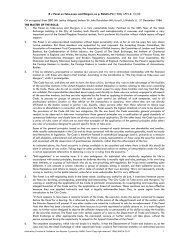
![Petrotrade Inc v Texaco Ltd [2000] Int.Com.L.R. 05/23 CA on ... - NADR](https://img.yumpu.com/12049751/1/190x245/petrotrade-inc-v-texaco-ltd-2000-intcomlr-05-23-ca-on-nadr.jpg?quality=85)
![Nicholas Drukker & Co v Pridie Brewster & Co [2005] ADR ... - NADR](https://img.yumpu.com/12033930/1/190x245/nicholas-drukker-co-v-pridie-brewster-co-2005-adr-nadr.jpg?quality=85)
